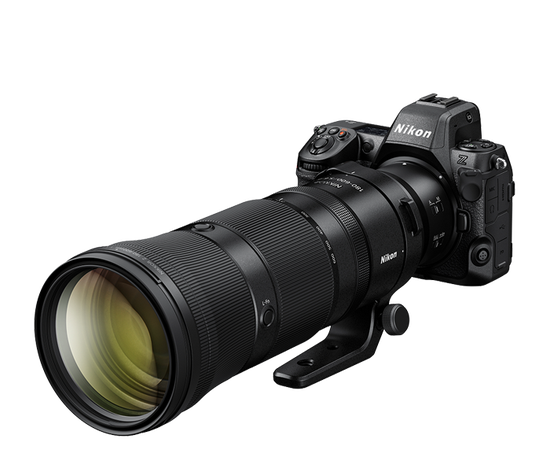Go the
distance.

- 180-600mmSuper-Telephoto Zoom
- Internal ZoomLens Length Never Changes
- VRImage Stabilization
(5.5 stops) - 1955 gComfortable Weight
- Z MountFull Frame/FX-format
Expand your capabilities.
Powerful 180mm-600mm range.
Short-throw internal zoom.
An all-internal design eliminates extending/retracting, improving handling, with only a 70° turn needed to go from 180mm to 600mm. The design also prevents dust or moisture from entering those moving parts.
Versatile close focusing.
Up to 5.5 stops of VR.
*Based on CIPA Standard; in [Normal] mode at the telephoto end when attached to a full-frame/FX-format camera.
Effortless operation.

Technology

IF Lens
A NIKKOR lens in which only the internal lens group shifts during focusing. Thus, IF NIKKORS do not change in size during AF operation, allowing for compact, lightweight lenses capable of closer focusing distances. These lenses will be designated with the abbreviation IF on the lens barrel.

Stepping Motor
NIKKOR Z lenses use a stepping motor for fast, accurate, smooth, quiet autofocus with reduced wobbling. This quiet drive system makes the lenses ideal for use when shooting video.

ED (Extra-Low Dispersion) Glass
An optical glass developed by Nikon that is used with normal optical glass in telephoto lenses to obtain optimum correction of chromatic aberrations.

Vibration Reduction
A Nikon in-lens technology that improves image stability by automatically compensating for camera shake. Lenses that offer VR will feature the abbreviation VR on the lens barrel.

Fluorine Coat
Photographers need gear that can withstand the elements. Nikon’s fluorine coat effectively repels dust, water droplets, grease or dirt, ensuring easy removal even when they adhere to the lens surface. Nikon’s fluorine coat endures a high frequency of lens surface wiping and its anti-reflective effect also contributes to the capture of clear images.

Aspherical Lens
A lens with a curved, non-spherical surface. Used to reduce aberrations and enable a more compact lens size. Aspherical lenses minimize coma and other types of lens aberrations, even when used at the widest aperture. They are particularly useful in correcting distortion in wide-angle lenses and help contribute to a lighter, more compact design by reducing the number of standard (spherical) elements necessary. Aspherical lens elements correct these distortions by continuously changing the refractive index from the center of the lens.

A/M
A/M stands for Auto-Priority Manual Mode. This mode also enables an easy transition from autofocus to manual during AF operation. However, mode switch sensitivity has been altered to reduce the possibility of sudden unintentional switching to manual focus while shooting.

Electromagnetic Diaphragm Mechanism
An electromagnetic diaphragm mechanism in the lens barrel provides highly accurate electronic diaphragm or aperture blade control when using auto exposure during continuous shooting.
LCD, Video and Photo Gallery images are for illustrative purposes only
Tech Specs
Focal Length Range
180 -600mmMaximum Aperture
f/5.6Format
FXVR (Vibration Reduction) Image Stabilization
example VRApprox. Dimensions (Diameter x Length)
4.4 in.110 mmx12.5 in.315.5 mmDistance to end of lens from camera lens mount flange Based on CIPA guidelinesApprox. Weight
68.96 oz.1955 g
- Mount TypeNikon Z Mount
- Focal Length Range180 -600mm
- Zoom Ratio3.33x
- Maximum Aperturef/5.6
- Minimum Aperturef/32
- Aperture Range180mm zoom position: f/5.6 - 32 600mm zoom position: f/6.3 - 36 The value displayed at minimum aperture may vary with the exposure increment selected on the camera.
- FormatFX
- Maximum Angle of View (DX-format)9° to 2° 40′
- Maximum Angle of View (FX-format)13° 40′ to 4° 10′
- Maximum Reproduction Ratio0.25x
- Lens Elements25
- Lens Groups17
- Compatible Format(s)FX, DX
- VR (Vibration Reduction) Image Stabilizationexample VR
- Diaphragm Blades9
- ED Glass Elements6
- Fluorine CoatYes
- Aspherical Elements1
- AutofocusYes
- Internal FocusingYes
- Minimum Focus Distance180mm zoom position: 4.27 ft (1.3 m) measured from focal plane , 200mm zoom position: 4.47 ft (1.36 m) measured from focal plane , 300mm zoom position: 5.48 ft (1.67 m) measured from focal plane , 400mm zoom position: 6.37 ft (1.94 m) measured from focal plane , 500mm zoom position: 7.19 ft (2.19 m) measured from focal plane , 600mm zoom position: 7.88 ft (2.4 m) measured from focal plane
- Focus ModeManual/Auto
- E-typeYes
- Filter Size95mm
- Accepts Filter TypeFront: screw-in
- Approx. Dimensions (Diameter x Length)4.4 in.110 mmx12.5 in.315.5 mmDistance to end of lens from camera lens mount flange Based on CIPA guidelines
- Approx. Weight68.96 oz.1955 g
- Lens TypeZoom
Product Forum
Support
Product Registration
Registering your Nikon product allows us to send you (with your permission) important updates, service information and helpful hints, and it makes it easier should you ever need to call in for help.
Register your product online now.Nikon Answers Site
We store all resolved problems in our solution database. If you can’t find a relevant answer, feel free to submit a question to our technical support team.
View Questions & Answers